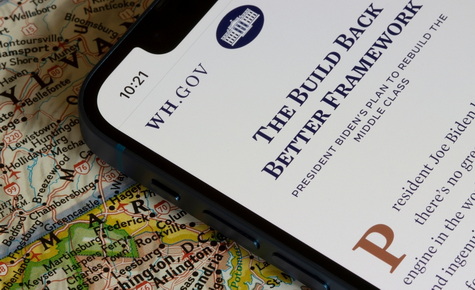Build Back Better Act Negotiations in “Cooling Off” Period as Congress Prioritizes Pressing Issues

Democrats this week signaled that negotiations over the Build Back Better (BBB) Act are in a “cooling off” period as Congress turns its immediate focus to pressing policy issues such as voting rights legislation and filibuster rules reform. (The Hill, Jan. 5)
BBB’s Climate Provisions
- Congress will face several other deadlines in the New Year, including a possible push later this month by Senate Democrats for a vote on the Build Back Better (BBB) Act, the need to extend funding for federal government operations beyond February 18, and the looming November mid-term elections. (Bloomberg and Roll Call, Jan. 3)
- Discussion on how to revive the multitrillion BBB Act followed Sen. Joe Manchin’s (D-WV) Dec. 19 statement on Fox News that he opposed the package. Manchin is a key vote in the 50-50 Senate to pass the BBB Act under reconciliation rules, which require a majority vote for passage.
- Manchin, who chairs the Senate Energy Committee, last month offered the White House a $1.75 trillion proposal that included funding for climate initiatives supported by The Roundtable. (Wall Street Journal, Jan. 4)
- Sen. Manchin affirmed on Tuesday that he shares the views of the Democratic caucus on the climate portions of the BBB package. “The climate thing is one that we probably could come to an agreement much easier than anything else,” Manchin said. (E&E News, Jan. 4)
- Sen. Manchin wants to restructure other aspects of the BBB bill, possibly paring down the cost of its healthcare, childcare and housing initiatives. (Wall Street Journal, Jan. 5)
- If the Senate ultimately passes the BBB Act in a manner that changes the House-approved version (H.R. 5376), the bill would need to go back to the House for another vote before it reaches President Biden’s desk. (Roundtable Weekly, Nov. 19)
Roundtable Support for Clean Energy Tax Provisions

- The BBB Act includes $550 billion for measures to fight climate change, which include a suite of Roundtable-supported clean energy tax credits and incentives amounting to $300 billion.
- The Roundtable sent a letter to Congressional tax writers on Nov. 16, 2021 detailing five recommendations that aim to improve green energy tax provisions affecting real estate. The Roundtable letter urged further changes to the BBB Act that would advance objectives aimed at slashing GHG emissions and making rapid progress toward a “net zero” economy by mid-century. (Roundtable letter, Nov. 16)
- The letter’s recommendations would increase and scale deployment of low- and zero-carbon technology in the nation’s commercial and multifamily building infrastructure.
- The need to address funding to keep the government is also pressing upon Congress. Current funding is authorized under a “Continuing Resolution” through Feb. 18, 2022. Congress has not yet reached agreement on full-year funding for fiscal 2022, which began Oct. 1, 2021.
The Roundtable will discuss its policy agenda for the new year during its Jan. 25-26 State of the Industry meeting (virtual), along with potential changes to the BBB Act, and how the mid-term elections in November may impact the congressional agenda.
# # #




 Congress should extend expiring tax incentives that promote investment and jobs in Opportunity Zones (OZs) as soon as possible, according to a letter to Congressional leaders from a diverse coalition of 22 organizations that includes The Real Estate Roundtable. (Dec. 21, 2021 coalition letter)
OZ Tax Incentives Expiration
Congress should extend expiring tax incentives that promote investment and jobs in Opportunity Zones (OZs) as soon as possible, according to a letter to Congressional leaders from a diverse coalition of 22 organizations that includes The Real Estate Roundtable. (Dec. 21, 2021 coalition letter)
OZ Tax Incentives Expiration
